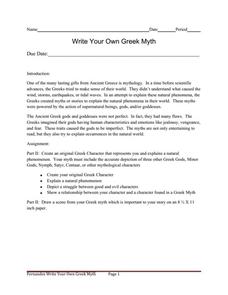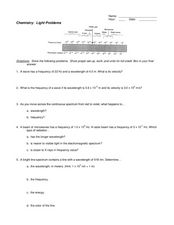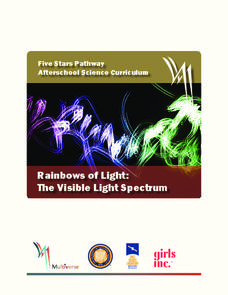Curated OER
Fun Physics You Can See
Fascinating aspects of electromagnetic radiation and its use in obtaining and transferring information are described here. Learners will find the connections to current technology interesting. Although the slides are text-heavy, they do...
Columbus City Schools
Totally Tides
Surf's up, big kahunas! How do surfers know when the big waves will appear? They use science! Over the course of five days, dive in to the inner workings of tidal waves and learn to predict sea levels with the moon as your guide.
Curated OER
Hazards: Sixth Grade Lesson Plans and Activities
Sixth graders explore the damage associated with an earthquake by designing a structure that can withstand earthquake intensities on a shaker board. They then view tips for preparing for an earthquake, and what...
National Institute of Open Schooling
Atomic Structure
Learners explain historical findings such as Rutherford and Bohr's contributions, explain wave particle duality, and formulate Heinsenberg's uncertainty principle. They also draw s, p, and d orbitals, explain more historical findings,...
Frost Middle School
Write Your Own Greek Myth
Invite your pupils to create original Greek characters and myths for their characters to star in. Similar to a traditional Greek myth, the story must explain a natural phenomenon, depict a struggle between good and evil characters, and...
City College of San Francisco
Making Inferences: Reading Between the Lines
Have you ever read part of a story and had to figure out what the rest was about? Practice making inferences with several short passages and multiple choice questions.
NOAA
Why Should I Care?: Show How Increased Carbon Dioxide Makes the Ocean More Acidic
How does a change in pH affect the ocean ecosystem? Scholars explore the idea by making an acid-base indicator in part seven of the 10-installment Discover Your Changing World series. First, they explore impacts of carbon dioxide in...
PBS
Code Creators
The lesson is real—even if the computer code isn't. Scholars learn about pseudocode, which simulates computer code using everyday language. They write pseudocode for simple actions, then have classmates guess the action from the written...
NOAA
Journey to the Unknown
What's it like to be a deep-sea explorer? Tap into the imaginations of your fifth and sixth graders with a vivid lesson, the second part of a six-part adventure. Learners close their eyes and submerge themselves in an expedition aboard...
K5 Learning
The Moon
Second graders read a short informational text passage about the moon and answer a series of questions based on what they read.
Tune Into English
Yellow Submarine – The Beatles – Notes
Enhance English language skills using the fan-favorite song, "Yellow Submarine" by The Beatles. Scholars predict what the song is about then listen and mark specific words they hear. Playing the song again, participants unscramble...
Positively Autism
"Saying "Hello" to People" Social Skills Story
Support learners who may be very shy or reserved in saying "hello" to new people with this set of story slides. The presentation begins with a few slides describing why it is good to greet others, and concludes with opportunities to...
Curated OER
Help Is on the Way
Students explore disaster aid and ways in which it is provided. They work in small groups to explore relief efforts aimed at South Asian countries affected by the recent undersea earthquake and tsunamis.
Curated OER
What's the Frequency, Roy G. Biv?
Students examine the concept of frequency and wavelength. They analyze how frequency and wavelength relate to each other by conducting an experiment involving measuring and timing wavelengths by pulling adding machine tape through an...
Curated OER
Lesson one
Pupils study waves and how it erodes a beach. For this energy lesson students complete a lab activity on waves and tides.
Curated OER
Properties of Light
In this light waves worksheet, students will measure the wavelength of different light waves and then calculate its frequency. This worksheet has 9 short answer questions and 10 fill in the blank questions.
Curated OER
Star Search
Seventh graders explore stars. In this star lesson plan, 7th graders apply generalities about space objects to constellations and explore the differences between radio waves and light waves by answering essential questions in their...
Curated OER
Physics of Space Flight
In this space flight instructional activity, learners will review physics terms relating to space which includes measuring the distance of space objects, how rockets work, and electromagnetic waves. This instructional activity has 10...
Curated OER
Earth's Atmosphere II
In this Earth's atmosphere worksheet, students use the chart shown to determine which information is given for each gas. Then they write the names of the layers of the Earth's atmosphere and describe which layer the temperature rises and...
Curated OER
Electromagnetic Spectrum Worksheet
These six multiple-choice questions ask pupils to evaluate the energy, wavelength, and frequency of particular electromagnetic wavelengths. Further questions then require them to apply their knowledge and convert certain values or give...
Curated OER
Light Problems
For this light worksheet, high schoolers describe the electromagnetic spectrum based on wavelength and frequency. Students determine the wavelength, frequency, and energy for given point on the spectrum. This worksheet has 10 problems to...
Curated OER
The Sun's Energy
Sixth graders examine how the sun's energy arrives as light with a range of wavelengths. They discuss the characteristics of light, examine the color of light using a spectroscope, and conduct an experiment using water and thermometers....
Multiverse
Rainbows of Light: The Visible Light Spectrum
Rainbows can teach us about the visible light spectrum. Learners observe multiple items that clearly display a rainbow to develop better connections. The lesson then explains wavelength using a rope to make waves.
Curated OER
Track a Tsunami
Students comprehend tsunamis, where they are likely to occur, and that underwater earthquakes cause them. They discuss what can be done to protect people form a tsunami, such as using computerized bupys, wave simulation machines,...























